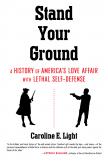An unsettling look at America's culture of self-defense
Caroline Light describes herself as “a historian who studies the ways in which collectively shared memories—the histories that take shape as truth in the public imagination—influence national belonging.” The imagined public truth Light takes on in this timely book hardly begins (or ends) with the killing of Trayvon Martin, an unarmed black teenager, by an armed member of a neighborhood watch group, on February 26, 2012, in Sanford, Fla., but it is the event that brought her topic to national attention. In 2005 Florida became the first of 33 states to enact “stand your ground” laws. S.Y.G. laws typically expand the historic reach of the “castle doctrine,” the right in English common law to self-defense on one’s own property, beyond domestic boundaries, and offer immunity from prosecution to those judged to make a reasonable claim to having felt threatened. George Zimmerman, Trayvon’s killer, became the poster child for stand-your-ground laws.
The problem, according to Light, is that the very people most likely to need the protection of such laws, vulnerable and stigmatized minorities including young black males, are not only the people least likely to enjoy that protection in practice, but are also the most likely to be perceived as the threats that justify white men standing their ground. Light makes her argument by way of rich historical cases from two centuries, troubling statistics (Americans represent 5 percent of the world’s population but own 40 percent of its guns) and a critique of “a vast ideological matrix built upon racist, heteropatriarchal, and capitalist privilege, intended to protect the white castle, at all costs.” All in all, it’s a compelling and deeply disturbing argument, but I fear some who most need to hear it will invoke the pre-S.Y.G. “duty to retreat” when threatened by such language. For those with a tolerance for it, this is an indispensable look at a dark side of American history and culture. In the dominant imagined public truth, some people belong more than others.
This article also appeared in print, under the headline “An unsettling look at America's culture of self-defense,” in the October 16, 2017, issue.










